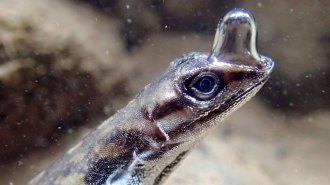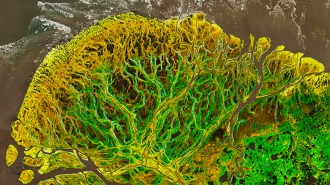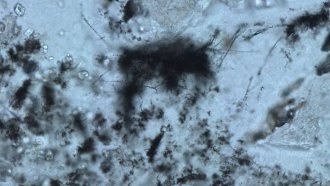Uncategorized
-
 Health & Medicine
Health & MedicineWhy the CDC says it’s crucial to start wearing masks indoors again
While unvaccinated people are driving the spread of the coronavirus, vaccinated people infected with the delta variant may also easily transmit it.
-
 Animals
AnimalsHow some lizards breathe underwater
Researchers have figured out how some anole lizards can stay underwater for as long as 18 minutes.
-
 Health & Medicine
Health & MedicineWhy it’s still so hard to find treatments for early COVID-19
Small studies, unexpected side effects and incomplete information about how drugs work can stymie clinical trials for drugs that can treat COVID-19.
-
 Climate
ClimateA stunning visualization of Alaska’s Yukon Delta shows a land in transition
Water and ice helped form the Yukon River’s delta. Now, climate change is reshaping it.
-
 Life
Life‘Wild Souls’ explores what we owe animals in a human-dominated world
The new book Wild Souls explores the ethical dilemmas of saving Earth’s endangered animals.
-
 Paleontology
Paleontology3.42-billion-year-old fossil threads may be the oldest known archaea microbes
The structure and chemistry of these ancient cell-like fossils may hint where Earth’s early inhabitants evolved and how they got their energy.
-

-

A century of exploring the endless final frontier
Editor in chief Nancy Shute discusses a century of astronomy and scientists' search for worlds beyond our own
By Nancy Shute -
 Physics
PhysicsWith Steven Weinberg’s death, physics loses a titan
The Nobel laureate advanced the theory of particles and forces, and wrote insightfully for a wider public.
-
 Health & Medicine
Health & MedicineWhat experts know so far about COVID-19 boosters for immunocompromised people
Some immunocompromised people remain at risk for severe COVID-19 despite being vaccinated. Studies hint that an additional vaccine dose might help.
-
 Space
SpaceHow do scientists calculate the age of a star?
There are a few different methods to determine the age of a star, but none are perfect.
By Lisa Grossman and Helen Thompson -
 Anthropology
AnthropologyA partial skeleton reveals the world’s oldest known shark attack
An ancient shark bite victim died quickly, before his body was recovered and buried, a new study finds.
By Bruce Bower